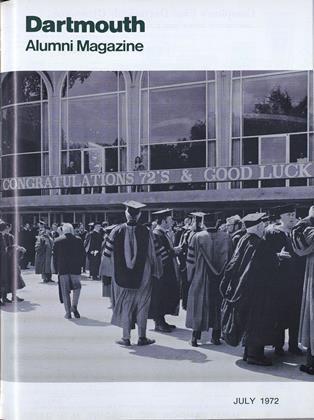Summer '72 at Dartmouth will be more of a continuum and less of a departure from normal academic routine than summers past, reflecting the first transitional step toward full year-round operation.
An expanded summer term approaching full parity with the other three, an exciting new venture in continuing education, a new chapter in the established success that is Alumni College, a lively and varied arts program at the Hopkins Center, and a full quota of conferences and symposia are components of the intellectual offerings of the College to its students and alumni and to a broad national constituency.
Undergraduates will be present in increased numbers. A record enrollment of between 750 and 800 is projected for the eight-week summer term, far outnumbering the 622 registered last summer. An expanded curriculum is being offered in 27 departments and programs built around such interdisciplinary themes as "Computer-Based Curriculum," "Literature and the Irrational: Myth, Mysticism, Madness," "The Control of Life: Ethical Issues in Bio-Medicine, Behavior Control, and Technology," and "Art: Visual Studies and History of Art." There will be more upper-level courses, and almost 30 visiting professors will join regular Dartmouth faculty members to form a teaching staff of over 80.
By the week before Commencement, more than 300 Dartmouth students had registered for the summer term. Included were 70 or 80 members of the Class of 1974 who have elected to switch to the Dartmouth Plan. This year's sophomores are the only group who can use the 1972 summer session to fullfill the summer residency requirement of the year-round plan.
The Dartmouth Institute, an innovative program designed as a capsulated liberal arts curriculum primarily for business and professional leaders, has gathered anticipatory momentum as July 2, the opening of its first season, approaches. About 35 men and women will spend a four-week "sabbatical" on the campus, in intensive examination of the broad issue of "Choice, Reason, and Reality for 20th-century Man." Executives or couples sponsored by 17 corporations will be joined by representatives of churches and other professions. The teaching staff of six senior professors from the Departments of Engineering, English, Government, Mathematics, and Religion will teamteach three core courses and coordinate elective seminars relevant to the overall theme.
Well over 200 adults and almost 100 youngsters had registered by June 1 for the ninth annual Alumni College, scheduled for August 13 through 24. Four Dartmouth professors, two of them recipients of the Harbison Award for Distinguished Teaching, will consider "The American Dream" from the standpoints of their separate disciplines of history, religion, literature, and film. In demonstrated denial of a generation gap in Dartmouth's first family, President Kemeny will teach in a special computer course for adults, while his daughter Jennifer, Yale '75, will instruct older children in an introductory course at the Kiewit Center. Applications were still being accepted in June for the remaining openings at Alumni College.
Music lovers, particularly aficionados of chamber music, will have a full schedule of concerts in an impressive range of styles, periods, and forms, to be presented each Tuesday and Saturday and on several Fridays from July 18 to August 26. The Vermeer, the Hungarian, and the Guarneri String Quartets, New York Pro Musica, a Baroque Ensemble, the New York Phiiomusica Chamber Ensemble, the Beaux Arts Trio, the contemporary Philadelphia Composers Forum, TheWorld of Gilbert and Sullivan, and a variety of accomplished soloists will be features of the Spaulding Auditorium summer calendar.
The Dartmouth Players Repertory Group, under the direction of Rod Alexander, will present a month-long season of three plays: Shakespeare's Love's Labour Lost, the musical SheLoves Me, and Arthur Miller's A Viewfrom the Bridge.
Exhibits of a variety of art forms, with special emphasis on the work of artist-in-residence Edward Giobbi and visiting artists Ivan Albright, Richard Anuszkiewicz, and Philip Guston, will make the Hopkins Center Galleries kaleidoscopic during the summer of '72.
A series of conferences, ranging in duration from two days to eight weeks and in number of participants from 15 to 1200, will add up to a total of almost 25,000 man- or woman- days on the campus. A workshop on Applications to Economics of New Methods of Computing Fixed Points is being held for six weeks, an Institute in Applied Mathematics for eight. A conference on Electronic Music is adding tone to Hanover until late July.
Fifteen scholars will discuss Computational Methods in Literary Studies during five mid-summer weeks, the National School Boards Association will meet for a week in late August, and 1200 members of the American Mathematical Society will spend the week before Labor Day on the campus. Other group meetings scheduled will deal with a variety of topics: Medical Ethics, Data Communication, Pharmaceutical Advertising, Time-Sharing, and Credit. In addition, the Social Science Research Council, the Sloan Foundation Committee, and the Common Fund Trustees will use the facilities of the Minary Center on Squam Lake.
 View Full Issue
View Full Issue
More From This Issue
-
 Feature
FeatureAlumni Awards
July 1972 -
 Feature
FeatureCOMMENCEMENT 1972
July 1972 By ROBERT B. GRAHAM '40 -
 Feature
FeatureHONORARY DEGREE CITATIONS
July 1972 -
 Feature
FeatureCollege Staff Members Reach Retirement
July 1972 By J.D. -
 Feature
FeatureAlbert I. Dickerson '30 1908-1972
July 1972 By C.E.W. -
 Feature
FeatureVincent Jones 52 Heads Alumni Council
July 1972
Article
-
 Article
ArticleH. William Shure '61 (r), New Haven lawyer
APRIL 1973 -
 Article
ArticleGramlich Fund
October 1973 -
 Article
ArticleCarnival Mouse
February 1974 -
 Article
ArticleBergen County
FEBRUARY 1969 By JAMES D. BINDER '52 -
 Article
ArticleThe 1952 Alumni Fund
December 1952 By KENNETH M. HENDERSON '16 -
 Article
ArticleThe Real Story Under Those Tents
SEPTEMBER 1999 By Kevin Goldman '99


